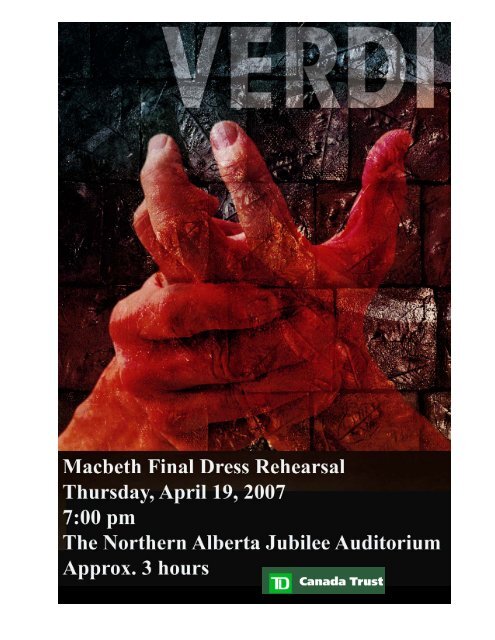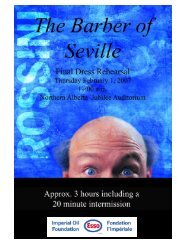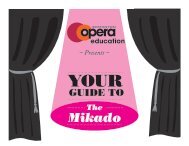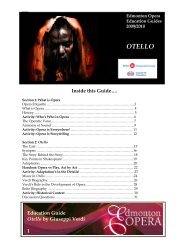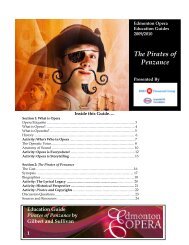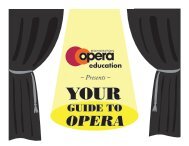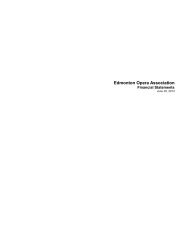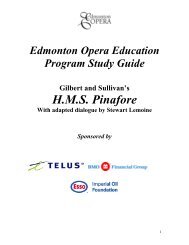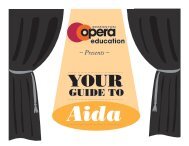Macbeth - Edmonton Opera
Macbeth - Edmonton Opera
Macbeth - Edmonton Opera
- No tags were found...
You also want an ePaper? Increase the reach of your titles
YUMPU automatically turns print PDFs into web optimized ePapers that Google loves.
<strong>Opera</strong> EtiquetteALWAYS BE EARLY! Once a performance begins, no one will be allowed intothe theatre until intermission. We suggest you arrive half an hour early to pick upyour tickets (if you don’t already have them), and prepare to enter the auditoriumfifteen minutes prior to showtime.USE THE RESTROOM Once in the theatre it is courteous to remain seated andinvolved in the production until intermission. Please do not leave the theatreunless there is an emergency.NO TALKING DURING A PERFORMANCE! Please be courteous to othersaround you by being quiet.APPLAUSE WELCOME! <strong>Opera</strong> is spectacle. Your presence in the audience isessential to complete the whole experience. Enjoy the performance and respond towhat you see. Unlike television or film, every live performance is unique. Onlyyou and the performers and musicians will share the experience you have in thetheatre. Your warmth and good humour are important to them, so when you likesomething, tell them with your applause.NO FOOD, DRINKS, OR GUM IN THE THEATRE. This is a rule strictlyenforced.NO CAMERAS OR TAPE RECORDERS.
presents<strong>Macbeth</strong>April 21, 24 and 26, 2007Music by Giuseppe VerdiLibretto in Italian by Francesco Piave andAndrea Maffei, after William Shakespeare’s play.Premiere: Teatro della Pergola, Florence, March 14, 1847.Revised version: Théâtre-Lyrique, Paris, April 21, 1865.ConductorDirectorJames MeenaMichael CavanaghThe Cast(in order of vocal appearance)<strong>Macbeth</strong>BanquoLady <strong>Macbeth</strong>ServantMacduffLady-in-Waiting/HecateMalcolmAssassin, First Apparition, MedicoSecond ApparitionThird ApparitionJason HowardPhilip CokorinosBrenda HarrisDavid EnglishDavid PomeroyRenée BradEric OlsenDavid EnglishTBATBAwith the<strong>Edmonton</strong> <strong>Opera</strong> Chorusand theThe <strong>Edmonton</strong> Symphony OrchestraMovement DirectorFight DirectorChorus DirectorRepetiteurLighting designed byScenery designed byScenery constructed byCostumes designed byCostumes constructed byStage ManagerAssistant Stage ManagersApprentice Stage ManagersBrian WebbPatrick HowarthPeter DalaShannon HiebertBretta GereckeJerome SirlinThe Portland <strong>Opera</strong> Scenic StudiosFabio TobliniThe Portland <strong>Opera</strong> Costume ShopTim YakimecHa Neul Kim and Jackie DawkinsMarisa Magus and Kerry JohnsonThere will be an intermission after Act 1 and after Act II. Acts III and IV are performed together.The performance is approximately 2 hours 50 minutes in duration, including intermissions.
SynopsisAct IIn a wood amid thunder and lightning a group of witches discuss the mischief they haveperpetrated. <strong>Macbeth</strong> and Banquo enter, generals in King Duncan's army: by way ofprophecy, the witches greet <strong>Macbeth</strong> as Thane of Glamis, Thane of Cawdor and King ofScotland, and Banquo as the father of kings. They are disturbed, especially Banquo, who ishorrified by the veracity of the witches' predictions when the King's messengers announcethat <strong>Macbeth</strong> has been made Thane of Cawdor.In the castle Lady <strong>Macbeth</strong> reads the letter in which her husband tells her of his meetingwith the witches, and she reflects that, in order for the prophecy to come true, King Duncanwill have to be killed. She incites <strong>Macbeth</strong> to commit the crime, although he is the victim ofterrifying visions. Duncan, spending the night in the castle as a guest, is assassinated. Inthe morning Macduff goes to wake Duncan and comes back horrified by what he has found.Everyone rushes to the scene to condemn the act of treason.Act IISince the witches predicted that Banquo would be the father of kings, <strong>Macbeth</strong>, seeing thisas an obstacle to his own ambitious plan to rise to power, decides to kill his friend togetherwith his son Fleance. He entrusts the task to a group of murderers who ambush them whilethey are going through a wood, but they are only partially successful: Banquo is killed andFleance manages to escape.Meanwhile in <strong>Macbeth</strong>'s castle a banquet is being held, whose festive atmosphere isinterrupted by the arrival of a murderer with blood on his face. When he recounts what hashappened, <strong>Macbeth</strong> is alarmed and starts to rave: Banquo's ghost appears before him, hishair soaked in blood. He speaks wildly to it, denying his guilt, to the terror of the guests;Lady <strong>Macbeth</strong> exhorts him to compose himself, but shortly after the ghost reappears.<strong>Macbeth</strong> resolves to go and question the witches again.Act IIIIn a dark cavern the witches are gathered around a cauldron. <strong>Macbeth</strong> arrives to questionthem and they call up a series of apparitions. The first tells <strong>Macbeth</strong> to beware of Macduff,the second that no man of woman born will harm him, the third pronounces him invincibleuntil he sees Birnam Wood moving towards him. Then eight kings file past, Banquo'soffspring who will rule: <strong>Macbeth</strong> tries to attack them, then faints. Witches and aerial spiritsrevive him and he spurs himself on to increase his power.
Act IVOn the borders of Scotland and England the Scottish refugees lament the fate of theircountry now that it is at the mercy of a bloodthirsty tyrant. The victims of <strong>Macbeth</strong>'s latestmassacre are Macduff's wife and children. Malcolm and Macduff prepare the revolt against<strong>Macbeth</strong>: every soldier will advance towards the castle with a branch in his hand.Inside the castle Lady <strong>Macbeth</strong>, watched over by a doctor and a lady-in-waiting, reveals hercrisis of conscience every night by reliving the brutal deeds in her sleep and tryingobsessively to wash the blood from her hands.The enemy troops are attacking <strong>Macbeth</strong>'s castle when the Queen's death is announced.Even this news does not shake him, but when he learns that Birnam Wood is movingtowards him he shouts that he has been deceived and, seizing sword and dagger, confrontsMacduff declaring he has no fear of him. Macduff tells him that he was not born, butuntimely ripped from his mother's womb. <strong>Macbeth</strong> is mortally wounded and dies.
Giuseppe VerdiComposer1813-1901Born in 1813 in the Italian village of LeRoncole near Busseto, Giuseppe Verdi spenthis early years studying the organ. By the ageof seven, he had become an organist at SanMichele Arcangelo. It was there that the youngVerdi was an altar boy and, according to myth,his mother saved him from the French in1814. In 1823, Verdi moved to Busseto andattended the music school run by AntonioProvesi. By the age of 13, he was an assistantconductor of the Busseto orchestra. Afterfinishing the school, Verdi applied foradmission to the Milan Conservatory. He wasrejected for admission, although one of theexaminers suggested that he "forget about theConservatory and choose a maestro in thecity." Verdi studied composition in Milan with Vincenzo Lavigna, a composer and themaestro at La Scala. Verdi bounced back and forth between Milan and Busseto until hewas named maestro of the Busseto Philharmonic in March 1836.By May 1836, he had married childhood sweetheart, Margherita Barezzi, his greatestbenefactor's daughter. He returned to Milan several years later, this time with a youngfamily.Verdi's first opera, Oberto , was brought to the stage at La Scala in November 1839 andran for multiple performances. The noted Ricordi firm published Oberto and, basedupon his initial operatic effort, Verdi won a contract for three additional operas. Hebegan work on his next opera, Un Giorno di Regno , but was interrupted when, one byone, the Verdis fell ill. Over the course of a few weeks, Verdi lost his son, his daughter,and his beloved wife to illness. Unfortunately, Un Giorno was a complete failure.Verdi vowed never to compose another comedy and developed a fatalistic belief ininescapable destiny. Even so, the director at La Scala kept faith with Verdi, who laterdeclared that with his next work, Nabucco , "my musical career really began." At dressrehearsals for Nabucco in the La Scala theater, carpenters making repairs to the housegradually stopped hammering and, seating themselves on scaffolding and ladders,listened with rapt attention to what the composer considered a lackluster chorusrendering of "Va, pensiero." At the close of the number, the workers pounded thewoodwork with cries of "Bravo, bravo, viva il maestro!" The opening of Nabucco was atriumph. Verdi was famous, commanding a higher fee than any other composer of histime.
I Lombardi followed Nabucco and won an unprecedented victory over Austriancensors. Verdi's triumph in retaining the libretto and melodic themes the censors hadhoped to ban as "religious" in nature forged the composer's lifelong reputation as anideological hero of the Italian people. This would be the first of his many battles withcensors for artistic freedom.Over the next seven years, the composer penned ten additionaloperas of varied success, gradually making the transitionbetween two distinct eras of Verdi composition. Initially captiveof the "bel canto" style and heir to Donizetti's artistic throne,Verdi continually experimented to produce his own operaticgenre in which melodic drama and identifiable musical essenceof character took center stage as an equal to vocal purity andelegance.It was an inspired stroke of boldness about which Verdicommented in explaining the innovative core of his work, IlTrovatore , "I think (if I'm not mistaken) that I have done well;but at any rate I have done it in the way that I felt it." In sayingso, he defined his own creative hallmark. Although a musical genius, Verdi composedspontaneously from the heart. A brilliantly schooled musician, he placed emotionalsensibility above intellect in all that he wrote. In the process, he created the remarkablemarriage of dramatic characterization and vocal power, an indelible artistic signature.The creation of an operatic tour de force based upon his ingenious artistic formulationassured Verdi's immortality, beginning in 1851 with Rigoletto , followed soon after by IlTrovatore , La Traviata, and ultimately in 1871, by Aida. Even without the masterpiecesthat followed - Simon Boccanegra, Un Ballo in Maschera, La Forza del Destino , andDon Carlos or his great Requiem Mass - the Maestro could have afforded to rest on hismusical achievements and stand unchallenged as the premier operatic composer of anyage. In fact, with the success of Aida, Verdi seemed to have abandoned composingaltogether, producing no new works for fifteen years.Fortunately for posterity, an electrifying libretto, Otello , created by poet Arrigo Boito,brought the composer out of his self-imposed retirement. The opening of Otello inFebruary of 1887 attracted an internationalaudience to Milan for a dramatic event which endedonly after the citizenry had showered Verdi with giftsand applause throughout twenty curtain calls andtowed his carriage to the hotel. Public festivitiescontinued until dawn.In 1893, with the premiere of Falstaff , Verdi and hisadoring audience repeated the entire sequence ofevents at La Scala - all in honor of a comedy he hadvowed as a young man never to write. The maestrofinally retreated to his country home in Sant' Agatawith his second wife, singer Giuseppina Strepponi.
They spent several peaceful years in retirement until her death in 1897. His wife's deathleft Verdi in a state of unbearable grief. He immediately fled Sant' Agata for the GrandHotel in Milan and, after four unhappy years, Verdi died in 1901, the victim of a massivestroke. Verdi's death left all Italy in mourning. He still is revered throughout the musicworld as the greatest of operatic composers and, more particularly, in Italy as a patriotichero and champion of human rights.Francesco Maria PiaveLibrettistBorn May 18, 1810 in Murano, ItalyDied March 5, 1867 in Milan, ItalyVenetian journalist, translator, stage manager and librettist, Piave first studied in Rometo become a priest, then tried journalism. In 1842, he became resident poet andperformance director at La Fenice theatre in Venice and remained there until 1860.Piave collaborated on many operas with Verdi, the first being Ernani, followed by I dueFoscari and Attila. His inexperience with these was improved upon with <strong>Macbeth</strong>, IlCorsaro and Stiffelio. The next opera, Rigoletto, was a success from the start, while LaTraviata failed miserably at its first outing – only to return in triumph a year later. Othercollaborations included Simon Boccanergra, Aroldo and La Forza del Destino. In 1860,Piave moved on to La Scala. He wrote almost 30 libretti for other composers includingMercadante, Pacini and the Ricci brothers. He suffered a stroke that led to his death inMarch 1867.c) 2005, Canadian <strong>Opera</strong> Company. Used by permission
The Life and Times ofGiuseppe Verdi1813• Verdi is born on October 10 th in Parma, Italy• Richard Wagner is born in Germany.• Americans capture York (Toronto), while the British take Fort Niagra and burn downBuffalo during the War of 1812.• McGill University is founded.1832• John Rowland builds a two-storey log building at Fort <strong>Edmonton</strong>. It is nicknamed “theBig House” or “Rowand’s Folly” and is the largest structure on the Western Prairies.1836• Verdi marries Margherita Baressi and has two children in the next two years.• Charles Dickens writes Pickwick Papers.• Boer farmers begin the Great Trek away from British rule and towards the foundation ofSouth Africa.1839• Verdi’s opera Oberta, Conte di San Bonifacio premieres at La Scala. He beings a lifelongassociation with the publisher Ricordi. His two children die suddenly from illness.• The bicycle is invented in Scotland.1840• Robert Rundle arrives and opens a school on the site presently known as FortSaskatchewan• Verdi’s wife Margherita dies suddenly of encephalitis and Un giorno di regno fails at LaScala.• Upper and Lower Canada are united by an act of parliament.• The Houses of Parliament in London (England) start construction.• The first restrictions on hours of employment for minors comes into effect in the U.S.1842• Verdi’s third opera Nabucco opens in triumph. The choruses from this opera becomehymns of the Italian patriots and freedom fighters.• The Canadian/U.S. border is defined in the Webster-Ashburton Treaty.• Ether is firs used as a surgical anaesthesia.1845• A scarlet fever epidemic hits <strong>Edmonton</strong>.
1847• <strong>Macbeth</strong> opens in Florence. Verdi buys Sant’Sagata as his new home.• Charlotte and Emily Brönte publish Jane Eyre and Wuthering Heights, respectively.• Alexander Graham Bell (inventor of the telephone) is born in Scotland.1848• In March, the “five days” of fighting in Milan drive out the occupying Austrian forces.• Revolutions sweet across Europe.• The California gold rush begins.• The safety match is invented.• Karl Marx and Friedrich Enges publish the Communist Manifesto.1851• Rigoletto premieres at La Scala, Milan. Verdi and Giuseppina Streponi, a giftedsoprano, move into Sant’Agata together, much to the disapproval of the locals.1853• Il Trovatore premieres in Rome and is a great success.1854• A year and a half after its disastrous premiere, La Traviata triumphs in Venice.• The first electric light bulb is invented in Germany.1858• Verdi and Giuseppina Streponi are married in Savoy, France.1859• Un ballo in maschera finally reaches the stage and is judged Verdi’s biggest successsince Il Trovatore in 1853.• Charles Blondin crosses Niagara Falls on a tightrope.1867• Don Carlos premieres in Paris.• The Dominion of Canada is established by the British North America Act.• Joseph Monier patents reinforced concrete.1871• <strong>Edmonton</strong> is incorporated as a village.• The premiere of Aida in Cairo is delayed because of the Franco-Prussian war. It finallyopens on December 24.• Rome becomes the capital of Italy.• The commune in Paris (subject of Les Misérables by Victor Hugo) rules for two months.• Lewis Carroll writes Alice Through the Looking Glass.• Charles Darwin publishes The Descent of Man.• P.T. Barnum opens his huge circus “The Greatest Show on Earth” in New York.
1872• The Canadian government grants free homesteads to settlers under the Dominian LandsAct.1874• The North West Mounted Police arrive in <strong>Edmonton</strong>.• Messa da Requiem first performed in Milan. Verdi is nominated to the Italian Senate.• In Paris, Claude Monet shows Impressions: Sunrise at an exhibition, which gives the artmovement its name.1876• The first hotel is built in <strong>Edmonton</strong>.1878• <strong>Edmonton</strong>’s population is 148. The first post office opens.1881• The first public school opens in <strong>Edmonton</strong> and serves as a couthouse and a meetinghall.1886• January 19 th is the coldest day ever recorded in <strong>Edmonton</strong> history. Temperatures fells to-49.4 degrees C.1887• Othello premiers at La Scala. Verdi is made an honorary citizen of Milan three dayslater.• Britain’s Queen Victoria celebrates her Golden Jubilee.• Vincent Van Gogh produces Moulin de la Galette.1889• Verdi decides to compose Falstaff and buys a site in Milan for a musicians’ retirementhome (Casa di Ripose).• The Eiffel tower is built for the Paris World Exhibition.• Adolf Hitler is born in Austria.1891• The first electric light is used in <strong>Edmonton</strong>.1893• Falstaff premieres at La Scala. Verdi is made an honorary citizen of Rome.• Art Nouveau emerges as an art style in Europe.1896• Giuseppina Verdi dies
1898• Verdi moves into a hotel in Milan to supervise the building of the Casa di Riposo.Teresa Stolz, a soprano who had premiered some of Verdi’s major female role, andVerdi’s friend for more than 30 years, keeps him company.1901• Verdi sufferes a final fatal stroke on January 21. The street outside the Grand Hotel iscovered with straw to muffle the noise of the horses’ hooves. He dies a few days laterand is buried in accordance with his wishes: “without music or singing.” One monthlater, his and Giuseppina’s coffins are transferred to the crypt at Casa di Riposo(founded in 1900), this time with a full state ceremony. Led by Arturo Toscanini, theforces of La Scala sing Va Pensiero, joined softly by the voices of tens of thousands ofpeople lining the black-drpaed streets, paying their last respects.• The low level bridge opens in <strong>Edmonton</strong> and is the first bridge to run across the NorthSaskatchewan River.Events listed are taken from Bernard Grun’s Timetables of History, New York: Simon and Schuster,1982; and The Canadin Global Almanac,ed. John Robert Colombo, Toronto: Macmillan Canada, 1995.by Caroline Hollway, Senior Manager, Education and Outreach(c) 2005, Canadian <strong>Opera</strong> Company. Used by permission-Adapted from an original timeline created by The Canadian <strong>Opera</strong> Company.<strong>Edmonton</strong> Information courtesy of www.edmontonhistory.ca
Fortune Telling and ProphecyCultures throughout history have been fascinated by the notion that there is some greater being directingthe course of our lives. Whether this is an almighty being like God, or an unseen energy or force such asfate, human beings have an enormous curiosity about the future and the unknown.Superstition led people to believe that gypsies possessed magical powers. Gypsies were nomads thattraveled through Europe and India doing odd jobs to survive. They sold charms and told fortunes throughtarot cards and palmistry to villagers who visited their camps looking for love charms, potions andamulets to protect them from evil and illness.In the modern world, we have psychic network television and countless websites dedicated to the art ofdivination, for a fee. After the events of Sept. 11, 2001 in New York City, attention was drawn to theprophecies of Nostradamus, who lived in the early 16 th century. He predicted many and varied events –so many and so varied that some of them seem to have come to pass. Do we connect these prophecies toworld crises to try and give meaning to random occurrences, or are there truly gifted people who seevisions of things yet to come?In the opera <strong>Macbeth</strong>, the Witches offer <strong>Macbeth</strong> visions of a future foretold. As one of these propheciescomes true, and <strong>Macbeth</strong> is indeed made Thane of Cawdor, he starts to believe in the validity of all thestatements. Was this supernatural vision, coincidence or can it be rationalized? After all, the story is setin a time of violent uprising and political infighting. The Thane of Cawdor was accused of treason andpaid with his life.Most importantly, <strong>Macbeth</strong> now believes in the prophecies and takes steps to ensure the other propheciesdo or don’t come true. The Witches told him that though he will be king, Banquo will father a line ofkings. To ensure that this does not come true, <strong>Macbeth</strong> arranges for Banquo and his son to be killed.After seeing Banquo’s ghost, <strong>Macbeth</strong> revisits the witches who offer him three apparitions. He isreassured by their proclamations that none can harm him who are “of woman born” and that he is safeuntil Birnam Wood moves to Dunsinane (his castle). He does not look behind the prophecies at what theymight mean.The recent movie Signs by director M. Night Shyamalan ties the concept of religion and faith toprophecy, exploring the concept that our faith in something is what makes it real. In the film, a priest andfather of two loses his faith in God after suffering a terrible tragedy. Hi is later given an opportunity tosee how his perception of the truth is really an inability to see the complex workings of fate and destiny.Children’s literature touches on the concept of divination and prophecy in the highly popular Harry Potterseries, where the young protagonist sees visions caused by a magical curse that has left him with apeculiar scar.There are numerous fairy tales and legends from around the world, which also have elements of prophecy.In the tale Sleeping Beauty, the king and queen try to rid the castle of every spinning wheel to preventSleeping Beauty from pricking her finger. The evil fairy finds a deserted room and fate leads SleepingBeauty to it, much like <strong>Macbeth</strong> is led to his fated end, though some say that he made some of his ownfate.
Discussion Points• Is life fated, or can you change your destiny?• Is there ever a circumstance where you would believe the prophesies of tarot cards, psychics orfortunetellers?• Can you believe everything that the chance turning up of cards dictate for you?• Is believing in the prophecy of cards, or similar, the key to making it happen?by Caroline Hollway, Senior Manager, Education and Outreach(c) 2005, Canadian <strong>Opera</strong> Company. Used by permission
JASON HOWARD, <strong>Macbeth</strong>Jason Howard is a graduate of Trinity College ofMusic and the Royal College of Music <strong>Opera</strong> School.An outstanding performer, Jason Howard'sappearances have generated unanimous criticalacclaim. These performances include Don Giovanniand Le Nozze di Figaro, Guglielmo in Cosi fan tutte,and Germont in La Traviata, all with Scottish <strong>Opera</strong>,the title role in Billy Budd and Showboat, both with<strong>Opera</strong> North. Jason Howard's past operaticengagements include the title role Rigoletto atScottish <strong>Opera</strong>; Mourning becomes Elektra atSeattle and New York City <strong>Opera</strong>s; Peter Grimes at the Bastille; La Traviata at EnglishNational <strong>Opera</strong>, the Minnesota <strong>Opera</strong>, New York City <strong>Opera</strong>, Opéra de Nantes and atCincinnati <strong>Opera</strong>; Posa in Don Carlos in Minnesota; the title role in Rigoletto in<strong>Edmonton</strong>, the title role in Eugene Onegin for Welsh National <strong>Opera</strong> and for <strong>Opera</strong>Ontario; Les Pêcheurs des Perles in Seattle; Marcello in La Bohème at Covent Gardenand in Geneva, Stuttgart, Opéra de Bastille Paris, Toulouse and Seattle; Valentin inFaust at Welsh National <strong>Opera</strong>; Di Luna in Trovatore and Sharpless in Madama Butterflyat Scottish <strong>Opera</strong>, and Escamillo in Carmen in Hamilton and at L'Opéra de Nancy. Hehas also appeared with the LSO and Sir Colin Davis in performances of Les Troyens,and in The Gondoliers at the BBC Proms. His recordings include The Student Prince,The Song of Norway, A Little Night Music, Showboat, Calamity Jane and The King & Ifor TER, and alongside José Carreras and Josephine Barstow in recital discs for Sonyand Decca. A CD of Jason Howard, singing songs from Hollywood musicals, hasrecently been released on Silva Screen Records. This season he will be returning toStrasbourg as Don Alfonso in Cosi fan tutte. Other engagements include Eugene Oneginand his return to Welsh National <strong>Opera</strong> as Marcello in La Bohème. The Opéra Nationaldu Rhin in Strasbourg continues to play an important part in Jason Howard`s career. It ishere that he will sing his first Wotan in the new production of Der Ring des Nibelungenby David McVicar, which starts in the 2006/2007 season with Das Rheingold.PHILIP COKORINOS, BanquoBass-baritone Philip Cokorinos has performed in over 30productions in over several seasons at the Metropolitan <strong>Opera</strong>.Most notable performances include Masetto in a “Live from theMET” telecast of Don Giovanni, the World Premiere of JohnCorigliano’s highly successful The Ghosts of Versailles, as well asthe MET premieres of Lady <strong>Macbeth</strong> of Mtsensk, War & Peace,The Gambler, and Sly. Engagements for 2006-2007 Seasoninclude Basilio in Il Barbiere di Siviglia with <strong>Opera</strong> Lyra Ottawa,Benoit/Alcindoro in La boheme with Kentucky <strong>Opera</strong>, Ben Selim inDom Sebastien and Marco in L’Arlesiana (cover) with <strong>Opera</strong> Orchestra of New York,Frere Laurent in Romeo et Juliette with Nashville <strong>Opera</strong>, Banquo in <strong>Macbeth</strong> with<strong>Edmonton</strong> <strong>Opera</strong>, Forester in Don Carlo, Foltz in Meistersinger (covers)with theMetropolitan <strong>Opera</strong>, Benoit/Alcindoro in La boheme in the MET <strong>Opera</strong> in the Park series,
Don Marco in The Saint of Bleecker Street and Pandolfe in Cendrillon with Central City<strong>Opera</strong>. Additional future engagements include Frere Laurent in Romeo et Juliette with<strong>Opera</strong> Carolina, Benoit/Alcindoro in La Bohème with the Los Angeles <strong>Opera</strong>, Bartolo inLe Nozze di Figaro with Atlanta <strong>Opera</strong>, and the title role in Don Pasqualewith Syracuse<strong>Opera</strong>. Equally at home on the concert stage, Mr. Cokorinos’ recent symphonicappearances have included Mephisto in Berlioz’ La Damnation de Faust and Verdi’sRequiem, Haydn’s Creation in Carnegie Hall, Verdi’s Requiem, and Herod in Berlioz’L’Enfance du Christ telecast with the NHK Symphony in Tokyo and recorded for Deccawith the Montreal Symphony. His discography includes two works of Hector Berlioz withthe Montreal Symphony and Charles Dutoit, Herod in L’Enfance du Christ and Wagner inHuit Scenes de Faust both released on Decca.BRENDA HARRIS, Lady <strong>Macbeth</strong>Ms. Harris has appeared in leading roles with opera companiesand orchestras throughout the world. In North America, she hasbeen heard at the Metropolitan <strong>Opera</strong> (Vitellia in La Clemenza diTito), The Washington <strong>Opera</strong> (title role in Agrippina and DonnaAnna in Don Giovanni), Washington Concert <strong>Opera</strong> (title role inRoberto Devereux), Minnesota <strong>Opera</strong> (title roles in Norma,Ermione, Armida and Semiramide, and Vitellia in La Clemenza diTito), New York City <strong>Opera</strong> (title role in Handel’s Agrippina,Donna Anna), Austin Lyric <strong>Opera</strong> (Chrysothemis in Elektra andKatarina in Shostakovich’s Lady <strong>Macbeth</strong> of Mtsensk), Atlanta<strong>Opera</strong> (Desdemona in Otello, Donna Elvira in Don Giovanni, and Countess in Le Nozzedi Figaro), Michigan <strong>Opera</strong> Theatre (Norma and Countess), Arizona <strong>Opera</strong> (Lady<strong>Macbeth</strong> in Verdi’s <strong>Macbeth</strong>), <strong>Opera</strong> Theatre of St. Louis (Countess), <strong>Opera</strong> Pacific(Rosalinde in Die Fledermaus and Donna Anna), and Utah <strong>Opera</strong> (title role in Ariadneauf Naxos). In Canada, she has sung leading roles with the Canadian <strong>Opera</strong> Company,Montreal <strong>Opera</strong>, <strong>Edmonton</strong> <strong>Opera</strong>, <strong>Opera</strong> de Quebec, and Vancouver <strong>Opera</strong>. In Europe,Ms. Harris has appeared in Spoleto, Italy as Eva in Die Meistersinger, with <strong>Opera</strong> duRhin in Strasbourg as Vitellia in La Clemenza di Tito and the title role in Barber'sVanessa, and most recently again as Vanessa with Teatro Massimo in Palermo. In2006, Ms. Harris debuted the Strauss Four Last Songs with the New Haven Symphonyas well as Vaughan Williams’ Sea Symphony under Maestro Keith Lockhart and theUtah Symphony. In 2007, she will return to the role of Lady <strong>Macbeth</strong> (Verdi) with<strong>Edmonton</strong> <strong>Opera</strong> as well as the role of Tosca with the Cleveland <strong>Opera</strong>, and will rejoinChicago’s Music of the Baroque with Jane Glover conducting. She will also return toAustin Lyric <strong>Opera</strong> for the season opening Gala. Ms. Harris has recorded leading rolesfor Newport Classic, including Scarlatti's Ishmael, Haydn's La Cantarina and TheCreation, and on Vox, Handel's Tolomeo. On the concert stage, she has also performedas soloist with the St. Louis Symphony, The Orchestra of St. Luke's, HonoluluSymphony, Buffalo Philharmonic, and Boston Baroque as well as numerous CarnegieHall performances with the Oratorio Society of New York.
DAVID ENGLISH, Servant, Assassin, 1 st Apparition,MedicoDavid English is currently finishing a master’s degree in operaperformance at the University of British Columbia where hestudies with Roelof Oostwoud. This past year he performed therole of Schaunard in the UBC <strong>Opera</strong> Ensemble’s production ofLa Boheme and Figaro in last summer’s Usti nad LabemMetropolitan theatre’s production of Le Nozze di Figaro in theCzech Republic. Recent roles with the UBC <strong>Opera</strong> ensembleinclude Dr. Bartolo also in Le Nozze di Figaro, Jupiter in Orphéeaux Enfers, and Colline in La Boheme. In 2005, he sang DonAlfonso in the Austrian American Academy’s production of Cosi Fan Tutte in Salzburg.Professionally, David has been engaged by Vancouver <strong>Opera</strong> and by the VancouverBach Choir.DAVID POMEROY, MacduffFormer Canadian <strong>Opera</strong> Company Ensemble Studio memberDavid Pomeroy has caught the attention of conductors anddirectors in Canada, the U.S. and Europe. “Blessed with a richtenor and thrilling high notes”, he was hailed in his role debutas Don José in Carmen for Pacific <strong>Opera</strong> Victoria and waslikewise applauded for Verdi’s Requiem with the VancouverSymphony. In addition to Verdi’s Requiem, his concertschedule has included Dvorak’s Stabat Mater, Bruckner’s Massin F minor and gala opera evenings for the VancouverSymphony and the Newfoundland Symphony. He rounded outhis season with performances and a recording of HarrySomers’ last opera, The Death of Enkidu for Soundstreams and the Window on Somersrecording project. David Pomeroy’s 2004 – 2005 season began with the role of Pollionein Norma for Pacific <strong>Opera</strong> Victoria and continued with the starring role of Lennie in OfMice and Men for Lyric <strong>Opera</strong> of Kansas City. Other featured performances from 2005include Beethoven’s Christus am Ölberge for the Vancouver Bach Choir, Stefano inFilumena at the National Arts Centre and Beethoven’s Symphony No. 9 for the VictoriaSymphony.RENÉE BRAD, DamaCanadian mezzo-soprano Renée Brad has performed in opera,oratorio, musical theatre, and chamber and solo recitalsthroughout Western Canada and in New York. A graduate ofthe University of Saskatchewan, she also studied MusicalTheatre at the American Musical and Dramatic Academy inNew York. Most recently, Renée performed the role of Berta in<strong>Edmonton</strong> <strong>Opera</strong>’s production of Il Barbiere di Siviglia. She
has also appeared as The Mother in Menotti’s Amahl and the Night Visitors, The Witchin Hansel and Gretel, Tisbe in La Cenerentola, Kate Pinkerton in Madama Butterfly,Mercedes in Carmen, Popova in Walton’s The Bear, and Kate in Elizabeth Raum’s TheDream of Nicholas Flood Davin. Favourite theatre roles include Rose in The SecretGarden, Meg Page in The Merry Wives of Windsor, Katisha in The Mikado, Amy inCompany, and Ella in Bells are Ringing. A frequent soloist with orchestras, Renée hassung Haydn’s Lord Nelson Mass and Paukenmesse, Schubert’s Mass in E-flat,Bruckner’s Te Deum, Mozart’s Coronation Mass and Requiem, Bach’s WeihnachtsOratorium and Johannes Passion, Vivaldi’s Magnificat and Gloria, Handel’s Messiah,and Beethoven’s Ninth Symphony. In February, Renée released a CD of ElizabethRaum’s music titled How Bodies Leave Ecstatic Marks with the Contrasts Trio for theCanadian Music Centre’s Centrediscs label. Renée lives in <strong>Edmonton</strong> with her husbandVern and their daughter Zara.ERIC OLSEN, MalcolmVancouver based tenor Eric Olsen recently sang theroles of Edmondo, Dance Master and Lamplighter inPacific <strong>Opera</strong> Victoria (POV)’s production of Puccini’sManon Lescaut, and Second Shepherd in POV’sproduction of Richard Strauss’s Daphne. Other roles atPOV include Triquet in Eugene Onegin and Flavio inNorma. For <strong>Opera</strong> NUOVA’s Vocal Arts Festival, Ericsang the title role in Les Contes d’Hoffmann. He alsoappeared in the Banff Centre’s production of Le Nozze diFigaro as Don Curzio. He has performed in schooltouring productions of Carmen and La Cenerentola, and was a member of the 2005Young Artist Program at Pacific <strong>Opera</strong> Victoria. In December 2006, Eric was the tenorsoloist in 2 performances of Puccini’s Messa di Gloria on Vancouver’s North Shore.Future engagements include Jenik in The Bartered Bride for the 2007 Vocal Arts Festivalwith <strong>Opera</strong> NUOVA.JAMES MEENA, conductor<strong>Opera</strong> Carolina General Director & Principal ConductorJames Meena consistently receives critical and public praisefor his performances. His special passion is for the music ofMozart, Puccini and Verdi, having conducted acclaimedperformances of Mozart's Die Zauberflöte, Le Nozze diFigaro, Don Giovanni and Die Entfuhrung aus dem Serail;Puccini's La Bohème, Madama Butterfly, Gianni Schicchi,Suor Angelica, Tosca, La Rondine; and Verdi's Falstaff, LaTraviata, <strong>Macbeth</strong>, Nabucco, Aida, Otello, Rigoletto, and IlTrovatore. Conducting highlights of recent seasons include anew production of Le Nozze di Figaro for L'Opéra deMontréal, Nabucco, La Bohème, <strong>Macbeth</strong>, The Pearl Fishersand Samson et Dalilah for <strong>Opera</strong> Carolina, the Korean Broadcasting System Symphonyin a nationally televised Thanksgiving concert; performances of Stravinsky's tour deforce, Le Sacre du Printemps with the National Symphony Orchestra, R.O.C., concerts
with the Cairo (Egypt) Symphony in the new Cairo <strong>Opera</strong> House, Don Pasquale for<strong>Opera</strong> Lyra Ottawa, Romeo et Juliette and Suor Angelica/Gianni Schicchi forChautauqua <strong>Opera</strong>. He has conducted legendary singers James McCracken, MignonDunn, Marilyn Horne, Sherril Milnes and Jerome Hines, as well as Diana Soviero, ReneeFleming, Denyce Graves, Jerry Hadley, Mark Delavan and Marcello Giordani. Recently,Maestro conducted performances of La Traviata and the annual Gala Concert withL'Opéra de Montréal as well as performances of La Vida Breve, Pagliacci and Rigolettofor <strong>Opera</strong> Carolina. Upcoming are performances of Fidelio and La Traviata for the ErfurtFestival in Germany, Roméo et Juliette for <strong>Opera</strong> Carolina, La Cenerentola for FortWorth <strong>Opera</strong>, and next fall he will conduct the world premiere of Victor Davies’ TheTransit of Venus for Manitoba <strong>Opera</strong>.MICHAEL CAVANAGH, stage directorMichael Cavanagh has directed many works here, notably newproductions of The Rake's Progress and La Traviata. Heserved as Artistic Director of the company from 1998 – 2001.He is one of Canada's foremost opera interpreters, havingdirected, written or developed pieces for virtually everycompany in the country. The last few seasons have seen himwork extensively in the United States, with major success andnew productions at Minnesota <strong>Opera</strong> (Magic Flute, Tosca),Arizona <strong>Opera</strong> (Marriage of Figaro) <strong>Opera</strong> Festival of NewJersey (Bluebeard's Castle), Hawaii <strong>Opera</strong> Theatre (LaTraviata) and Kentucky <strong>Opera</strong> (Madama Butterfly). He hasdeveloped and directed the premieres of several importantnew works, including Beatrice Chancy (Rolfe/Clark) and The Midnight Court(Sokolovic/Bentley), which he recently remounted at The Royal <strong>Opera</strong> House in CoventGarden. Upcoming engagements include returns to Calgary <strong>Opera</strong> (Tosca), L’Opéra deMontréal (Roméo et Juliette) and Vancouver <strong>Opera</strong> (L’italiana in Algieri). As a writer, hehas 7 operatic libretti to his credit, which have seen dozens of productions across thecountry. He has written two with <strong>Edmonton</strong> composer Jeff McCune: Zeus and thePamplemousse (produced by <strong>Opera</strong> Lyra Ottawa in 2004) and The Y2K Black DeathOratorio (produced at the <strong>Edmonton</strong> Fringe Festival in 2000).BRETTA GERECKE, lighting designerBretta grew up in Winnipeg and has resided in <strong>Edmonton</strong> forthe past thirteen years. She graduated from the University ofManitoba with a Bachelor of Interior Design in 1992, and fromthe University of Alberta with a Master of Fine Arts in TheatreTheatre, where she has designed world premieres whichhave toured internationally to Great Britain, Australia, the U.S.and across Canada. Bretta also works at The Citadel Theatre,Can Stage, Workshop West Theatre, <strong>Edmonton</strong> <strong>Opera</strong> andThe River City Shakespeare Festival, Theatre Calgary andThe Globe Theatre. She is the recipient of ten ElizabethSterling Hayes Awards for Outstanding Achievement in Set
and Lighting Design, The Enbridge Award for Best Emerging Artist, and was shortlistedfor The Siminovitch Prize. Bretta designed a summer home on Devil’s Lake Alberta, andcontinues her work as an archaeological illustrator.BRIAN WEBB, movement directorBrian Webb graduated with distinction from the Universityof Alberta with a Bachelor of Fine Arts degree in Theatre.He then moved to New York City, working with EricHawkins who had an influence on his early dance making.During the 1970's, Brian premiered many of his firstdances with the Carol Conway Company in New York.Returning to <strong>Edmonton</strong> in 1979, he formed the Brian WebbDance Company with his "company in residence" at GrantMacEwan College. In 1986, Brian completed a Master ofFine Arts degree in Choreography at the California Instituteof the Arts. He returned to <strong>Edmonton</strong> and began to create a solo dance theatrerepertoire that presents a series of "self portraits" in collaboration with composers,writers, and visual artists. He has received three Interdisciplinary Project Grants from theCanada Council. In 1995, Brian was awarded the Syncrude Award for Innovation inArtistic Direction, and in 1998 won the Telus Award for Arts of the Future (for ProjectDesire: the mountains and the plains). He was selected as an interdisciplinary artist inthe 2000 Alberta Biennial of Contemporary Art. Brian is also the Artistic Producer of theCanada Dance Festival in Ottawa. He has been inducted into the <strong>Edmonton</strong> CulturalHall of Fame (June 2002) and received the Queens Jubilee Medal (September 2002).PATRICK HOWARTH, fight directorPatrick is very happy to be returning to <strong>Edmonton</strong> <strong>Opera</strong> after agreat experience choreographing the fights for Don Giovanniearlier in the season. He has been the fight director at the RiverCity Shakespeare Festival since 2000. Last season, hereceived the Sterling Award for Choreography for his fights inRomeo and Juliet. Patrick has also staged fights for the Citadel,Northern Light Theatre, Concrete Theatre, Shadow Theatre,Studio Theatre, <strong>Opera</strong> NUOVA, Theatre North West and manyothers. Thanks to all the folks at <strong>Edmonton</strong> <strong>Opera</strong>. Enjoy!PETER DALA, chorus master<strong>Edmonton</strong> <strong>Opera</strong>’s resident conductor, chorus master. He hasworked with opera and ballet companies such as the BaselBallet and Zurich Ballet in Switzerland, the Hungarian State<strong>Opera</strong> and the National Ballet of Hungary, with performances inMonte Carlo, Israel, New York, Spain and China. Careerhighlights include Don Giovanni and the ballet A MidsummerNight’s Dream in the Singapore and Hong Kong Festival of the
Arts, and the ballet Spartacus for the Budafest Summer Festival in Hungary. Heconducted the world premiere of John Alleyne’s ballet Orpheus for Ballet BC inVancouver, Alberta Ballet's A Midsummer Night’s ream, as well as The Nutcracker tourof Spokane, Vancouver, Victoria, <strong>Edmonton</strong> and Calgary for five consecutive years. For<strong>Edmonton</strong> <strong>Opera</strong> he has conducted Romeo and Juliette, The Tales of Hoffmann, ThePirates of Penzance, Cosi fan tutte, The Merry Widow, The Mikado, Madama Butterfly ,South Pacific, The Emperor of Atlantis, and Weill in Weimar, 1929. For <strong>Opera</strong> Nuova heconducted Britten’s A Midsummer Night’s Dream and Offenbach’s The Tales ofHoffmann. As Music Director of Alberta Ballet, Peter Dala conducted Prokofiev’s Romeo& Juliet, Edmund Stripe’s Alice in Wonderland, Balanchine’s Rubies, the world premiereof Emily Molnar’s Carmina Burana, and Jean Grand-Maitre’s Cinderella. This comingsummer he will conduct <strong>Opera</strong> Nuova’s production of Kurt Weill’s Street Scene at theTimms Centre.SHANNON HIEBERT, repetiteurShannon Hiebert is one of Canada’s most talentedaccompanists. A native of Winnipeg she began her training atthe University of Manitoba. She went on to study at the BanffCentre for Fine Arts with Martin Isepp and pursued graduatestudies in accompanying and chamber music at the Universityof Michigan in the studio of renowned accompanist, MartinKatz. Much in demand as a collaborative artist, she has beenheard frequently in recital and broadcast and has been heardin concert across Canada and the United States as well asTaiwan and Japan. Shannon has performed as a soloist withthe Royal Winnipeg Ballet and the Winnipeg SymphonyOrchestra. As an accompanist she has worked with many ofCanada’s most prominent artists, including Tracy Dahl, Monica Huisman, Patricia OCallahan and Measha Brueggergosman. Known for her versatility as a pianist Shannonhas worked in ballet, contemporary dance, opera, recital, musical theatre and symphonicsettings. Highlights of her recent concert work include a cross-Canada tour withcoloratura soprano, Nikki Einfeld and performances at the Centara New Music Festivalincluding the world premier of new works by T. Patrick Carrabre, Diana McIntosh, TimBrady and Peter Paul Kaprowski. Her discography includes Rhymes and Reveries, withcoloratura soprano, Tracy Dahl, Prairie Voices with the Winnipeg Singers and StarryNight in benefit of Winnipeg Harvest. Shannon resides in <strong>Edmonton</strong>, Alberta where sheworks as a freelance accompanist / vocal coach. She lives with her husband Joe, theirson Max.
TIM YAKIMEC, stage manager<strong>Edmonton</strong> <strong>Opera</strong>’s stage manager since 1996, Tim Yakimechas been engaged by <strong>Edmonton</strong> <strong>Opera</strong> for such productionsas The Barber of Seville, Don Giovanni, La Bohème,Bluebeard’s Castle and Erwartung, Filumena, The Emperor ofAtlantis, Lakmé, Turandot, Cavalleria Rusticana, Pagliacci, TheMerry Widow, Of Mice and Men,The Magic Flute, Rigoletto,Tosca, and The Rake’s Progress. Tim has also stage managedThe King & I starring Richard Chamberlain for Hawaii <strong>Opera</strong>Theater, Pélagie for the National Arts Centre/Canstage, Luciadi Lammermoor for <strong>Opera</strong> Saskatchewan, Into the Woods,Amadeus and A Street Car Named Desire for Atlantic TheatreFestival, and Ruthless, The Musical!, Measure for Measure, The Tempest, In Trousers,and Goblin Market, for The Leave it to Jane Theatre; Babes in Arms for The CitadelTheatre and Transit of Venus for Workshop West. He was also production stagemanager for the Royal Visit extravaganza at the Commonwealth Stadium in 2005.HA NEUL KIM, assistant stage managerMs. Kim is happy to return to <strong>Edmonton</strong> <strong>Opera</strong>. Her recentopera credits include The Barber of Seville, Don Giovanni, LaBohème, Duke Bluebeard's Castle and Erwartung, Filumena,Porgy & Bess , Weill in Weimar 1929, Madama Butterfly(<strong>Edmonton</strong> <strong>Opera</strong>); Rigoletto, Cosi Fan Tutte, Don Giovanni,The Elixir of Love, Lucia de Lammermoor , CavalleriaRusticana/ I Pagliacci (Manitoba <strong>Opera</strong>); Abduction fromSeraglio, Orfeo ed Euridice , and Orphee aux enfers (<strong>Opera</strong>NUOVA). She has also worked with theatre companiesincluding Northern Light Theatre, Concrete Theatre, TheCitadel, Workshop West Theatre, Catalyst Theatre and TheNational Arts Centre. Other Credits including Main Stage Stage Manager for Royal Visitand Field stage manager for Opening and closing ceremony for 2005 World MastersGames. Ms. Kim attended the University of Alberta, BFA Technical Theatre Productionin the Stage Management division.JACQUIE DAWKINS, assistant stage managerJackie Dawkins is a graduate of the Grant MacEwan Community College TheatreProduction Program, and is thrilled to be back assistant stage managing with the<strong>Edmonton</strong> <strong>Opera</strong> after taking time away from her career to raise a family. She was theassistant stage manager for the <strong>Edmonton</strong> <strong>Opera</strong> for the 1992/1993 and 1993/1994opera seasons during which time she assistant stage managed Don Pasquale, TheMagic Flute, The Turn of the Screw and Rigoletto. She has remained active in thetheatre community assisting in the Wardrobe department at the Mayfield Dinner Theatre.


